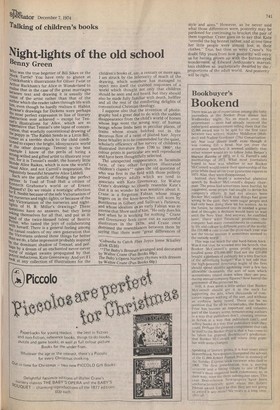Bookbuyer's
Bookend
There was an air of expectation among the forty journalists at the Booker Prize dinner last Wednesday night. No so much over the prizewinner — most had already received the embargoed announcement telling them that the £5,000 award was to be split for the first time between two writers: Stanley Middleton (Holiday) and Nadine Gordimer (The Conservationist). Nor over dinner itself, even though it was costing £13 a head. Nor yet over the acceptance speeches: it seemed unlikely that either winner would try to follow John Berger's Marxist diatribe of 1972, or J. G. Farrell's odd murmurings of 1973. What most journalists hoped to hear was whether or not Booker McConnell would renew their sponsorship of the prize when their seven-year guarantee expires in 1975. Alas, they were disappointed.
Instead they heard a somewhat plaintive speech by Booker McConnell's deputy chairman. The press had sometimes been hurtful, he suggested; some people had sought to deride his company's efforts. It had not always been Booker McConnell's fault that things had gone wrong in the past: they were sugar people and had only been doing their bit for writers. As to the future, he remained coy. It needed a great deal of thought; a decision would have to wait until the New Year, And anyway, he confided later, there were financial problems; the company had many commitments to community life and culture in different parts of the world; the £10,000 it cost to run the prize each year was not the trivial amount it sometimes seemed to the outside world This was too much for one hard-bitten hack.
Was it not true, he scowled into his Scotch, that Booker McConnell's gross profit margins totalled some £70,000,000? Had not the £10.000 bought a plethora of publicity for a tiny fraction of the advertising budget? Was it not odd that the high-powered directorial might of the firm should spend months agonising over a few tax allowable " thousands, the sort of sum which accountants rciund down when they are producing annual company figures? How horrid the gentlemen of the press can be. Still, it does seem a little unfair that Booker
McConnell should get it in the neck for supporting the arts, when thousands of companies support nothing of the sort, and without an eyebrow being raised. There can be no question that for all its vicissitudes, the Booker Prize has become an important and valuable part of the literary scene, remunerating authors in a way that publishers don't. creating interest in fiction in a way that publishers can't, and selling books in a way that publishers Wish they could Perhaps the greatest compliment that can he paid to the Booker Prize is that it has come to be taken for granted. Bookbuyer's prediction: that Booker McConnell will renew their prize, but with some changes.
Speaking of literary prizes, it is four years since Beaverbrook Newspapers trumpeted the advent of the £1,000 Robert Pitman Prize in memory of the Sunday Express book reviewer who died in 1968. The .first presentation was a moving .iccasion and a fitting tribute to one of Fleet Street's most respected hook columnists; so, in their way, were the three subsequent ones. This to year Beaverbrook Newspapers have been uncharacteristically quiet about the Robert Pitman award. Can-it be that they are not going oaward t n‘
more? Six yciars is it lung time„ after all.


































 Previous page
Previous page